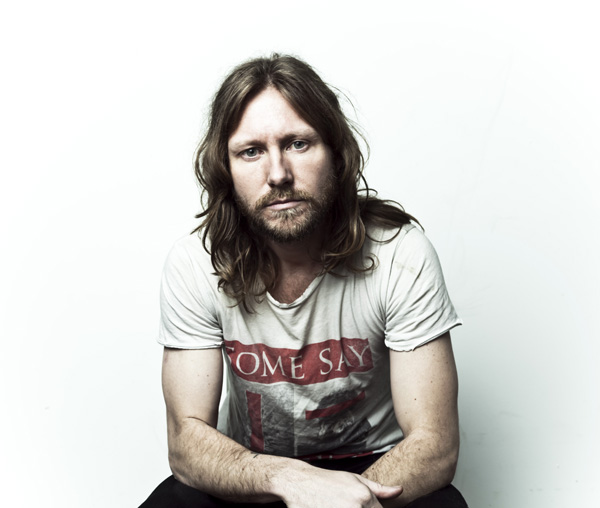Videos by American Songwriter
[Photo Credit: Danny Clinch]
At 61 years of age, Tom Waits is still as ornery, mischievous, and lovable as he was when he quipped “I’m so God damn horny that the crack of dawn better be careful around me” on 1975’s Nighthawks At The Diner.
His twentieth studio album, Bad As Me, comes out on Tuesday and he’s again crafted an album rich with his junk yard rhythms and broken china voice. The guitarists Marc Ribot and Keith Richards have both been enlisted; each first worked with Waits on 1985’s Rain Dogs. (Ribot has recorded and toured with Waits consistently over the years, while Richards co-wrote and sang on “That Feel” from 1992’s Bone Machine.) The album also features Waits’ son, Casey Waits, on drums, as well as Charlie Musselwhite on harmonica, Augie Meyers (from Doug Sahm and Sir Douglas Quintet fame), David Hildalgo (of Los Lobos, who appeared on Bone Machine), among other musicians.
It’s been seven years since Waits’ last album proper, 2004’s Real Gone. In the interim, he released a live album, Glitter And Doom, and the sprawling (but charming) career rarities retrospective Orphans: Brawlers, Bawlers & Bastards. So it’s not that Waits hasn’t been up to much (he seems to keep a low profile in Northen California, a locale he said he chose because he likes to pee in the yard), but when an official album from Old Tom Frost himself comes down the road, it’s certainly news.
In between rockers like “Chicago” and “Bad As Me,” the album has several slower numbers, like the doleful “Back In The Crowd.” But the final song on the album, “New Year’s Eve,” is one that fits into the large Waits oeuvre of wistful ballads, pieces of reflection amid the din of noise. Waits might even consider it a holiday song. (On a December 21, 1983, performance on Late Show With David Letterman, Waits played “On The Nickel,” a song about L.A.’s Fifth Street from a film of the same name, with bassist George Duvivier. “It’s got kind of a holiday feeling,” Waits told the studio audience.)
On “New Year’s Eve,” Waits and his wife and songwriting partner Kathleen Brennan craft a colorful scene from a family gathering gone-awry.
“If you’ve ever been at one of those gatherings where things went badly, where we all sing even though the fireworks scared the dog and he’s been gone for two hours, and someone lit the sofa on fire, and Marge got food poisoning, and Bill O’Neal called the cops,” Waits recently described the song to Pitchfork.
The song’s chorus builds out a song within the song, as the characters begin to sing “Auld Lang Syne.” “The song needed a chorus and they didn’t have one. So Kathleen and I said, ‘Come on, we’re talking about New Year’s, let’s just do it!’ Waits said.
It’s not the first time Waits has refashioned “Auld Lang Syne” in one of his songs. “A Sight For Sore Eyes” from 1977’s Foreign Affairs begins with the Scottish tune.
One also hears “Auld Lang Syne” at the opening of Waits’ long out-of-print 1988 concert film Big Time (there’s an accompanying album with a different track order), which is a pseudo-chronicle of his 1987 tour, coming off the success of his ‘80s trilogy Swordfishtrombones, Rain Dogs, and Frank’s Wild Years (which was staged as a play in Chicago in 1986 and recorded as a studio album and released in 1987). At the outset of Big Time, “Auld Lang Syne” plays and a TV announcer says “Happy New Year” before we see Frank O’Brien (Waits alter-ego of the era, played by Waits) waking up.
“New Year’s Eve” is filled with the clever Waits-isms we’ve come to expect: anthropomorphized rain, gunshots (briefly mistaken for fireworks), drugs and the threat of incarceration, and stars that look like diamonds. There’s the Waitsian litany of names and a no doubt purposefully sketchy mise-en-scène. All in all, we have no real clue what the hell is going on at this New Year’s party; but it all seems to add up somehow.
Waits told Canada’s CBC radio that his songwriting process is “somewhere in between Tourette syndrome and the birth of a boil. They kind of erupt out of you. Most songs have very humble beginnings.”
Waits also stressed that the truth is not something he’s necessarily keen to provide for listeners on his albums.
“I always think of that line in Procul Harum’s ‘A Whiter Shade Of Pale,’” Waits told Pitchfork. “‘I was feeling kind of seasick and the crowd called out for more.’ But what if it had been something else? ‘The crowd was disinterested,’ or ‘I was sick to my stomach and the crowd got up and left.’ Maybe that’s what happened. That’s why they get the big bucks. They know how to sell it. The truth is overrated. Avoid it all costs.”
http://www.youtube.com/watch?v=KsQl74yejYQ












Leave a Reply
Only members can comment. Become a member. Already a member? Log in.